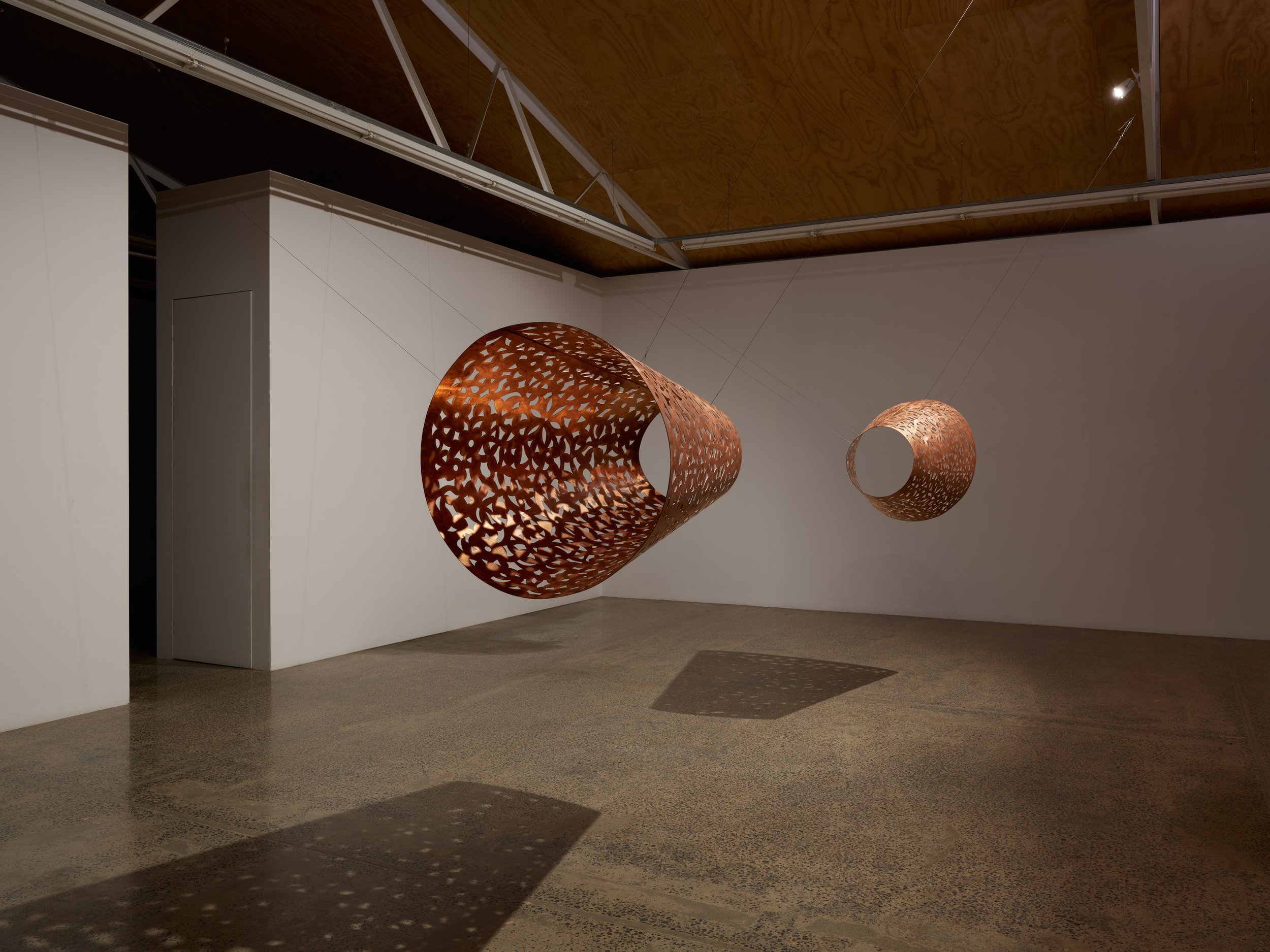5364 nocturne
5 October 2024 - 2 March 2025 Dunedin Public Art Gallery, Aotearoa New Zealand
installation view, single-channel video, sound, engraved and pierced copper sculptures, engraved copper prints
Making her exhibition debut in Aotearoa New Zealand, Shireen Taweel is the Dunedin Public Art Gallery’s International Visiting Artist for 2024. Based in Warrane Sydney, Taweel is a multi-disciplinary research-led artist whose work considers the histories and futurisms of collective space, materiality, and cultural practice. Her most recent work looks at the influence of the celestial navigation technologies of Arab astronomy on the future movement of people through migration and pilgrimage. Arriving in Ōtepoti Dunedin on 1 September 2024, Taweel’s time in Aotearoa continued a methodology of research, navigation, and travel, laid down during her pilgrimage across the Australian continent from mid-June to mid-July 2024. The relationship between the two pilgrimage sites is carried by the exhibition title, with 5364 reflecting the nautical miles between Ōtepoti and the points of pilgrimage across the Australian continent, which ended on the west coast.
During the residency period, Taweel undertook a performative pilgrimage that started in Ōtepoti and moved north-west across the South Island. Within the exhibition, this journey is documented through a new moving image work, three navigational devices (quadrant, astrolabe, and compass), and a set of copper engraved prints. Together, this new body of work asks us to reflect on the power of cumulative observation and our own relationships to pilgrimage, whether it be cultural, spiritual, or informed by the practicalities of traversing whenua. Guided by the careful tracking of the night sky, 5364 nocturne speaks to how the continuing contributions of the Arabic sciences can produce alternative futurisms for space migration.
5364 nocturne, installation view. Images supplied by Dunedin Public Art Gallery. Photographer Alex Lovell-Smith
L - R: Southern celestial quadrant, 2024 hand pierced, engraved copper, silver solder. Qibla + compass, 2024, hand pierced, engraved copper, silver solder. Southern celestial astrolabe, 2024, hand pierced, engraved copper, silver solder.
5364 nocturne, 2024, single-channel video and sound. Duration: 16 minutes, 45 seconds
Lake Takapō 43.98 degrees south, 2024, engraved copper plate, unique print
Al-Tusi preferred to rely on perfect circles instead
12 October – 9 November 2024 STATION | MELBOURNE
installation view, hand formed and pierced sheet copper, 81 x 101 x 39 cm (each)
Al-Tusi preferred to rely on perfect circles instead engages with the ocular and the accumulation of observations through astronomical devices such as the telescope, astrolabe and quadrant. This latest exhibition acknowledges the mathematical contribution of trigonometry by Nasir al-Din al-Tusi and the profound foundation his advances in mathematics have pinned for current astronomy and astrophysics research, and imaginings for the celestial movement of people in the future of migration into Space.
The pierced motifs in the two suspended copper works are informed by the calculations, equations, and measuring systems used to identify specific stars and other celestial bodies, and for a myriad of purposes which include celestial navigation, measuring distances, and calculating time. The materiality of copper predominant throughout Taweel’s practice, is synergetic with the early instruments of astronomical observation. The instrument’s working parts crafted from copper, and the process of engraving used to record measurements and calculations on the instruments. Light is employed within the installation to create a fully immersive presentation of the work, illuminating its affinity with our scientific and spiritual astronomical bodies.
photos taken by Cristo Crocker
Calculations for Movement
presented with STATION Australia at ArtBasel Hong Kong
hand pierced and engraved copper, silver, patina treatment
In this series of works conceived for the navigation of the future spiritual and sacred in celestial space, Taweel draws upon the histories of the Arabic Science’s celestial navigation and astronomical instruments. Taweel’s hand pierced and engraved copper speculative works are a provocation of materiality to the consequences of the relationship of science and spirituality. In a future of space migration and pilgrimage, where the scientific mechanism designed to navigate the universe, unfastens metaphor to direct pilgrimage, is the risk of leaving the pilgrim adrift in infinite space increasing? How will the pilgrim navigate towards the spiritual or sacred centres of the re-presented celestial body? As light passes through the pierced motifs of hand-held ornate forms, the transparent objects method of use remains hidden. An instrument’s potential to navigate the intersection of body, astronomy and spirit is considered by a body of weightless mass looking for its soul in celestial space.
Shireen Taweel, Calculations for Movement, 2024 (foreground)
Daniel Boyd, Untitled (AMFOSL), 2024 (background)
photos taken by Kitmin Lee
© Shireen Taweel 2025












